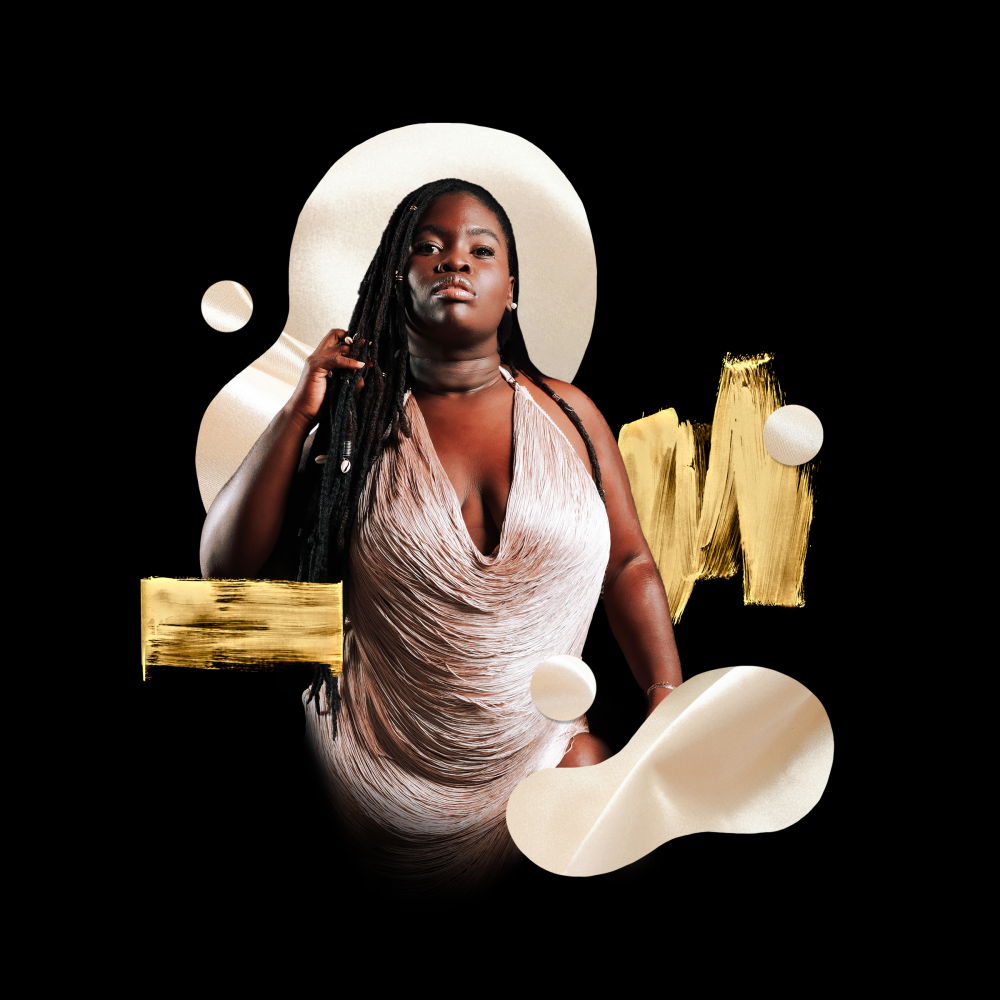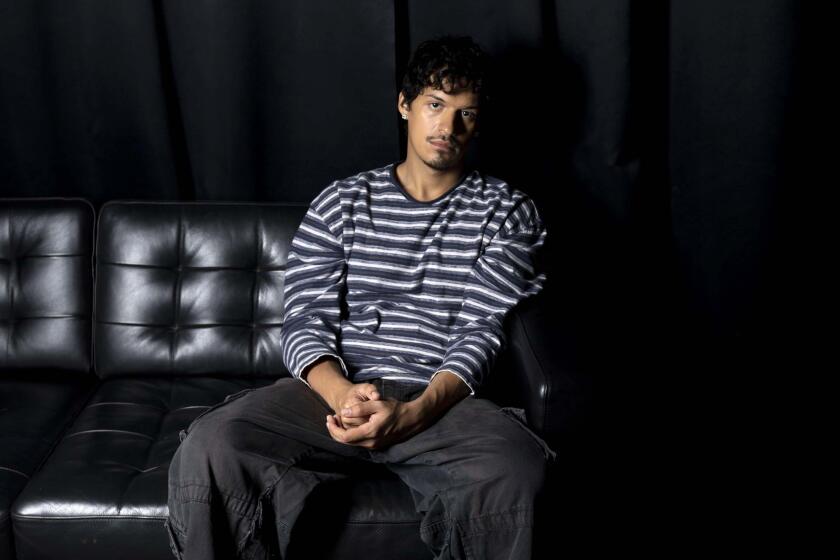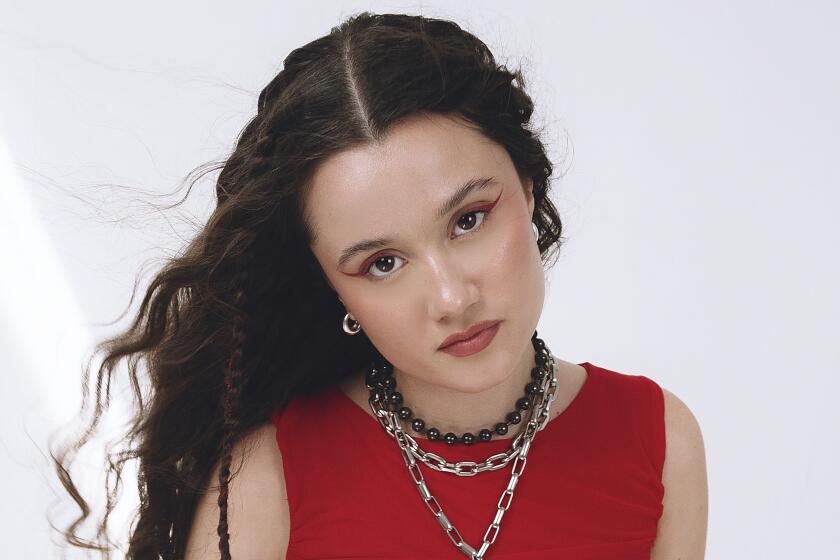
- Share via
Daymé Arocena believes every person of African descent born outside of the continent is given a mission in life.
“You have to ask yourself, ‘Why wasn’t I born in Africa? Why was I born in a place where I have to fight just to be who I am?’” Arocena said.
With “God Said No,” Omar Apollo opened up about the dissolution of his relationship. The singer discusses the album and posing nude for painter Doron Langberg.
The 32-year-old musician grew up in Havana during Cuba’s “special period” — a decade-long economic depression that hit the country at the start of the 1990s. She experienced limited access to electricity and food while sharing a space with 14 family members. But every night, no matter the circumstances, the percussive sounds of rumba filled her childhood home. As Arocena watched her aunts sing, her uncles drum and cousins dance, she knew she had found her purpose.
“Since I was a kid, I saw how music can heal people’s lives even when situations get worse. If you are surrounded by music, at least your soul is going to be fine,” she said.
That belief was put to use during the recording of “Alkemi,’’ Arocena’s fourth album, released in February. The project is a step in a new direction for the Grammy-nominated jazz singer, one rooted in the defining rhythms of Afrobeats and focused on presenting a version of Latin pop from the perspective of Black woman — something she finds to be absent from the genre.
Arocena’s musical credentials date back to her early years. When she was 8, her parents enrolled her in the Amadeo Roldán Conservatory, Cuba’s most prestigious music school, where she began classical training. At the time, the conservatory’s curriculum was focused solely on Russian and European composers — popular Cuban music was looked down upon and prohibited to play. During the day, Arocena would practice conducting Tchaikovsky and come home to the lively sounds of timba and cha-cha-chá.
“If I’m being totally honest, I loved what I learned. Classical training gives you skills that you can develop into whatever you want,” she said. “You have the technique to play the instrument perfectly, but music is not about perfection. Music doesn’t care about perfection at all. Music is about connections.”
Within the conservatory’s restrictive teachings, Arocena found a safe space in a jazz choir. She says that being introduced to the fluid genre gave her a sense of freedom by allowing her to use her voice in a new way and get to know the inner workings of a jazz standard. Once finishing school with a degree in choir conducting, she went on to co-found Cuban Canadian jazz group Macqueque.
Gaining acclaim on the island as a jazz singer led her to release her first solo album, “Nueva Era” in 2015 — a Latin-inspired jazz infusion featuring African-style chanting and soulful vocals. Three years later, the Cuban government instituted Decree 349, a policy that required artists to get permission from authorities before a performance. For the sake of her artistry, Arocena decided to leave.

“You can’t imagine immigration until you have to feel it. You have to be [in a new country] without anyone and without even the possibility to go back. You are in a position where you have to ask for mercy, and that’s the worst thing I could describe for a person,” said Arocena.
She and her husband immigrated to Canada in the middle of 2019. As they adjusted to a new life in Canada, the COVID-19 pandemic struck. Arocena says she sank into a depression where she couldn’t even bring herself to listen to jazz.
“I wanted to listen to music that made me dance. I needed to move, but I was stuck. Jazz had become too overwhelming,” she said.
Joaquina reflects on winning the Latin Grammy for best new artist, her forthcoming first album and performing alongside Andrea Bocelli.
Stuck in an unfamiliar country, she began to second-guess leaving Cuba. In July 2020, Beyoncé released “Black Is King,” the pop star’s reimagination of Disney’s “The Lion King.” The musical film and the accompanying album made Arocena remember why she got into music in the first place.
“Without this situation, ‘Alkemi’ wouldn’t exist,” said Arocena.
“Black Is King” intrigued Arocena because not only was it the first time she had heard such raw Afrobeats in pop music, but Beyoncé was openly singing to orishas — gods in the Yoruba religion popular in Cuba. Arocena says she finally saw a part of herself represented in mainstream music. At the same time, it made her realize just how absent Black artists were in the world of Latin music.
“I don’t need everybody to look like me. But there is no space for Black women like me in the mainstream markets. People like me are always in the cultural center but never selling out stadiums,” said Arocena. “It’s the reason why when I walk down the street, people talk to me in English. People don’t believe I live in the Caribbean.”
The erasure of Afro Latino people is something Arocena struggles with, especially given how much Latin music comes from African people. She lists a few genres off the top of her head: “reggaeton, salsa, merengue, cumbia and dembow.”
“Black Is King” lit a spark within her. She was ready to make music again. Her first call was to producer Eduardo Cabra, of Calle 13 fame. He invited her to his home in Puerto Rico to start working.
Upon her landing on the Caribbean island, the tropical air, the surrounding greenery and colorful buildings struck her. It was a landscape she had thought she would never see again. Arocena says she was soon introduced to a culture and a people that she could not only relate to but that felt like her own.
“When I arrived [in Puerto Rico], my feelings were so strong. It was like going back home. There’s no way to describe what you feel after leaving that type of immigration situation — exile and leaving your country because of dictatorship — then with the pandemic and isolation. Finding a place in the world that looks like home is all I needed,” said Arocena.
The short trip quickly turned into a permanent move and a completed album.
“Alkemi” is an exploration of sound and self. Over 10 tracks, Arocena infuses pop sounds into her neo-soul style. She says she even returned to lyrics she had started writing years ago but never finished.

In “American Boy,” Arocena sings about falling in love with a man who wasn’t afraid to hold her hand in public, backed by a percussion line that’s reminiscent of an R&B melody. “Por Ti,” a track about body positivity that embraces sensuality, is layered with trap and rumba beats.
“These songs describe many episodes of my life, but I wasn’t ready to show up the way I am now,” she says of her album. “Music finds the way. I don’t push things. I’d rather have music let me know when it’s ready to come out.”
Her first release in five years, “Alkemi” stands as a point of connection between who she was when she left Cuba and who she is now, living in Puerto Rico.
“Being here in Puerto Rico has been gas for my engines. I needed it. I needed to be here,” said Arocena.
Daymé Arocena will headline a free concert on Saturday in downtown Los Angeles. Co-presented by De Los and Grand Performances, the show will be hosted by KCRW’s DJ Wyldeflower and will include a live performance from special guest Pan Dulce, featuring Alan Lightner. You can RSVP for the event here.
More to Read
The Latinx experience chronicled
Get the Latinx Files newsletter for stories that capture the multitudes within our communities.
You may occasionally receive promotional content from the Los Angeles Times.









